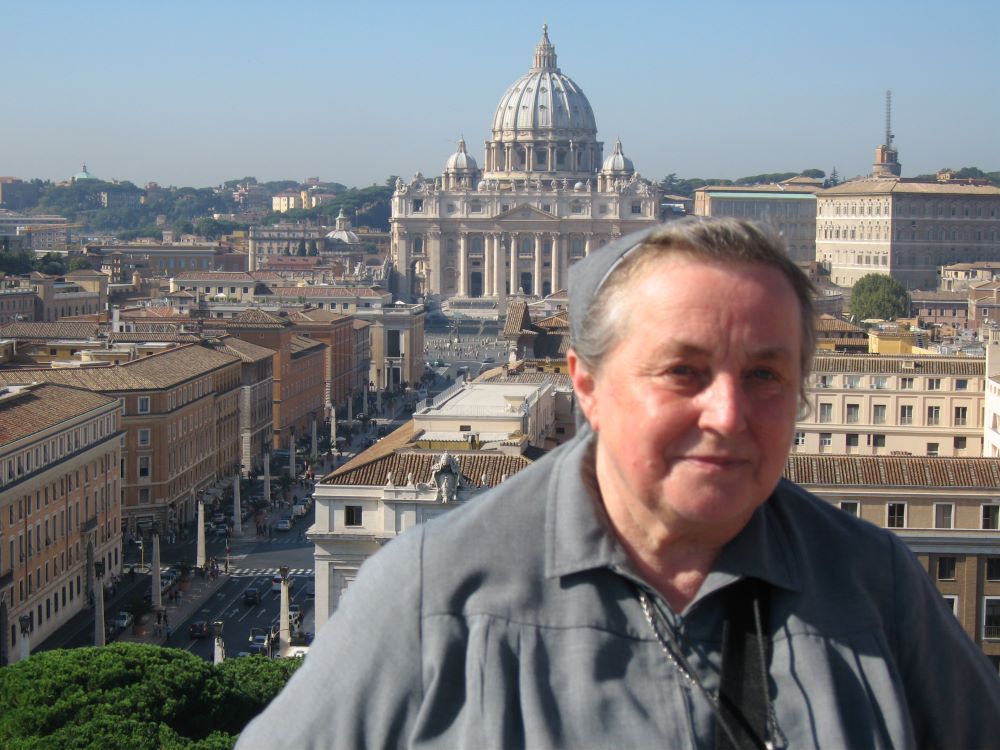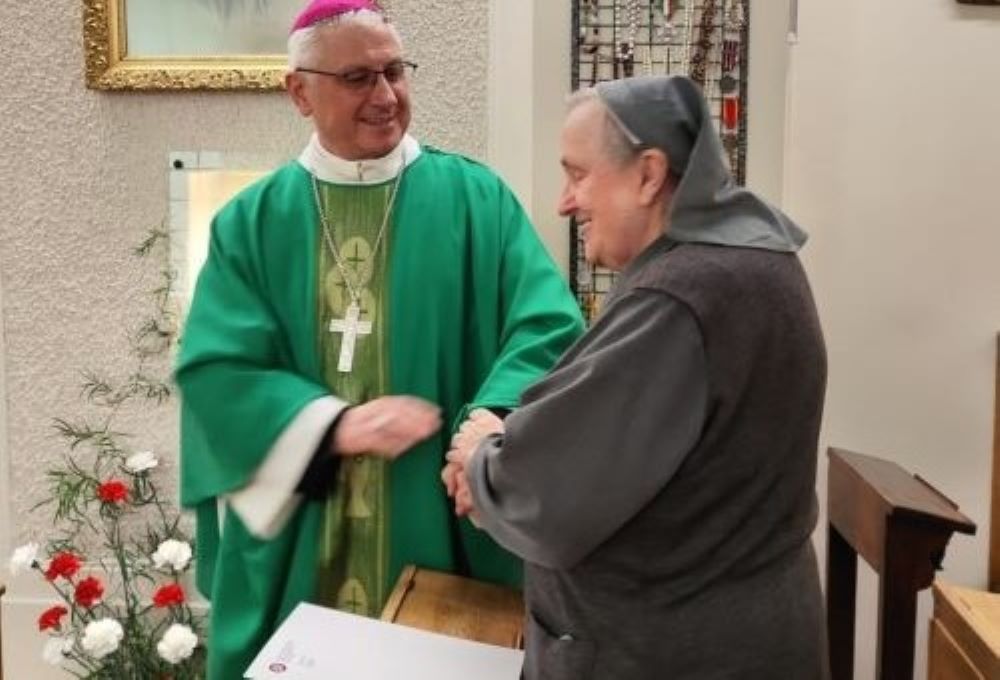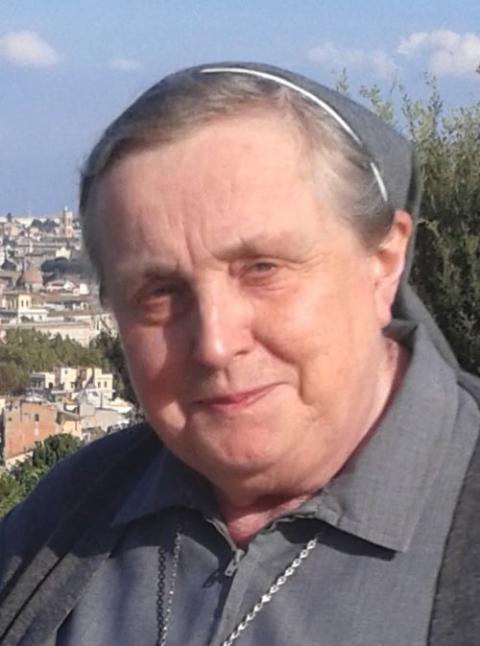
Mother Jolanta Olech, seen in Rome while attending a Vatican meeting, served as superior general of the Grey Ursulines from 1995 to 2007 and held many prominent positions in Polish and international Catholic organizations. (Courtesy of Ursuline Sisters, Warsaw)
As falling Mass attendance and dwindling vocations stoke anxieties in Poland's influential Catholic Church, the future of female religious orders is also under discussion.
Mother Jolanta Olech joined the congregation of the Ursuline Sisters of the Agonizing Heart of Jesus, also known as Grey Ursulines, in 1967 and served as a diplomat to the Vatican's Apostolic Nunciature in Scandinavia. She served as her order's seventh superior general 1995 to 2007.
She headed Poland's Conference of Higher Superiors of Female Religious Orders for 27 years, first as president and later as secretary general. She also served on two bishops' conference commissions and the Vatican's Congregation (later Dicastery) for Institutes of Consecrated Life and Societies of Apostolic Life.
She also represented Poland at the Rome-based International Union of Superiors General, which represents 600,000 sisters and nuns from 80 countries. In 2006, Pope Benedict XVI named Mother Jolanta Poland's principal nun and awarded her the church's Pro Ecclesia et Pontifice medal four years later.
As the foremost leader of Polish religious sisters, Mother Jolanta told the Gazeta Wyborcza daily in 2017 that she would resist any infringement of their dignity. In 2018, she said nuns should be better paid and acknowledged for their work.
In 2019, she also warned against the molestation of sisters by male clergy and welcomed pledges by Pope Francis to tackle abuse problems.
"Certainly, this has a wider setting and reflects a general attitude towards women in our society - a society to which the church belongs," she told Poland's Catholic Information Agency, KAI.
"We're not children or people without free will - and we must, as nuns, look after ourselves... We must respect ourselves and ensure others respect us too."
Although she formally retired from Poland's conference of superiors in September, Mother Jolanta remains active in its work and is optimistic about current challenges. These have included a consistent decline in vocations, which has left Poland's 105 orders with 15,940 members, almost half of pension age, compared to 22,597 two decades ago. She recently spoke with Global Sisters Report.

Mother Jolanta Olech appears at a Thanksgiving Mass for her retirement after 27 years as headed Poland's Conference of Higher Superiors of Female Religious Orders in Warsaw on Nov. 14. With her is Bishop Artur Mizinski, secretary-general of the Polish Bishops' Conference. (Courtesy of Ursuline Sisters, Warsaw)
GSR: Looking back over your 27 years at the head of the Conference of Higher Superiors, how much has changed in Polish religious life?
Olech: All life is a process — not stable and fixed, but constantly developing — and so it is with the consecrated life. Certainly, this life is quite different in today's Poland than when I started. People have changed with each generation, and successive conference boards have worked to ensure an awareness of changing times and a readiness to adapt — while maintaining what's fundamental, of course, to our theology and tradition, in line with the church's mission as reflected in the various living charisms of particular orders.
Whereas most Polish nuns came originally from rural backgrounds without much education, today's female orders include university professors, media experts, doctors, teachers, accountants — even a few rock stars. Are they sufficiently valued and appreciated by the church?
It's true, we have a much more varied composition now — not just professors and experts in various fields, but also sisters specializing in therapeutic psychology, social work, pediatrics and pedagogy — and we very much depend on finding people with the best types of competence and work potential in proportion to our needs and possibilities.
As for being undervalued, it's hard to say. There are situations like this, but plenty where sisters are greatly valued and recognized for their life and work. Everything depends on a particular milieu — it's never black and white.
Polish female orders have witnessed a steady decline in vocations. Whereas there were over 1,200 novices and postulants in 2003, there were just 193 last year. How worried are you?
This is a very serious problem. We were always proud that we enjoyed so many vocations, and this latest shortfall has been painful in every part of the church. It's affecting diocesan and religious priests as well, and I wouldn't be able to compare female orders and say who has more and who has less, but the general lack of personnel has assumed crisis dimensions. It's raised worries whether our work can be maintained in some areas.
But orders outside Poland face the same challenges too, and we are responding similarly, trying to cooperate more with lay people and continue what can be continued. People very much depend on nuns to maintain their work in school teaching, catechesis and other fields.
Pope Francis has called for Catholic women to be given more prominent roles, discussing the "feminine aspect of the church" at an early December meeting of his international Council of Cardinals. Would you like nuns to be given more decision-making powers in the Polish church?
Until recently, the church here has managed quite well with having all decision-making positions occupied by priests. But times have changed — and so have the needs. We don't know what will happen in the future. But the basic issue is competence, not just the quota or proportion of people working in one area or another. With vocations still reducing, we're not in any hurry to send sisters to work outside our orders, and it seems that the time has not yet come for a sister to become, for example, secretary general of the bishops conference, as has been the case with our neighbors. But that time will come. We just need patience — and discernment.

Mother Jolanta Olech (Courtesy of Ursuline Sisters, Warsaw)
Perhaps it was never properly understood in the West that Polish nuns were quite content to let male clergy do all the work if that's what they wanted. It enabled sisters to concentrate on their work vocations and prayer life.
Yes, exactly! But the world is changing quickly, and we're not in a position to keep track of everything or even discuss everything. Rather, we need to save what can be saved. The pope has had the courage to say that sisters should be allowed into decision-making positions, and the Vatican's Dicastery for Consecrated Life now has, for the first time in history, a religious sister as its secretary. We'll see how well she's accepted — but in any event, she's there.
Poland's Catholic Church has been badly affected by abuse scandals, such as the appalling case of Sister Bernadetta, from the Sisters of St. Charles Borromeo, who was given a two-year jail term for abusing children and inciting the rape of minors at a care home in Zabrze. Last summer, a victim was awarded 500,000 zlotys ($124,000) in the largest-ever compensation payout in Poland. Have such cases damaged the image of female orders?
I should first correct the premise of your question. There has been one such case involving female orders in Poland, and it dates back 20 years or more since she's already served her prison sentence. It was indeed a dramatic case. But I haven't heard of anything similar in an order-run children's home, and we can't, based on this one case — involving sisters, who, judging by their behavior, clearly weren't right in the head — make accusations against the whole monastic scene.
I can't take responsibility for the lifestyle of particular convents — and perhaps things have sometimes happened that shouldn't have. It's a theme that will certainly recur, and it provides an occasion to look at ourselves more critically — to live our religious lives and train our fellow sisters so that no such scandals happen again.
But it would also be good sometimes to survey how many children — molested by parents and relatives, with no chance of surviving in normal conditions — have been protected and brought up by sisters. For any amount of scandalous activity, far more good is always being done.
According to conference data, the number of convents has fallen in Poland from 2,591 two decades ago to 1,985 today. But most of these now have their own websites, YouTube channels, Facebook, Instagram and X accounts, and more than half of all Polish nuns now have university degrees and technical qualifications. How do you see the future?
God's plans aren't known to us, but I can't imagine the church surviving without religious sisters, communities of women completely devoted to prayer and contemplation, work and service. As to how new and reformed religious orders will look, we also don't know. But it's worth remembering there are still over 600,000 nuns worldwide, of whom 70% belong to open orders like mine, which emerged in the late 19th and early 20th centuries. Indeed, they exploded at the time like a volcano, as tens of thousands of women who had no vocation to the contemplative life came forward wishing to serve others — in Africa, Asia and Europe.
Advertisement
Did anyone foresee this? No. And the religious orders at that time hardly knew how to handle it. The impulse was stronger than the orders themselves — and perhaps God is preparing us today for some new decisive reform, which will enable forms of devotion and commitment to the church to revive once again. We may not know when or how it will happen. And perhaps some orders (I'm sorry to say this) will have to die out so new ones can be born, better adapted to the needs of the world.
In a letter of thanks on behalf of the Polish Bishops' Conference in mid-November, its secretary general, Bishop Artur Mizinski, described you as "a master of life" and "herald of the future." But I've heard stories of how the bishops used to fidget nervously and apprehensively when you came to address them.
No, no — it's not true! There was a time when I co-chaired the bishops' conference plenary sessions with the primate, Cardinal (Józef) Glemp, and I think there were some misgivings about giving a woman access to a place where important matters were being discussed. But they invited the president of the Conference of Male Superiors as well, and I never encountered any hostility or disdain from the side of bishops.
Of course, they weren't all happy that I was taking part — some maybe thought it would limit their freedom to speak. There was also some gossip, and what happened behind my back, I don't know. But no one left the room because of me, and no one expressed any hostility — at least not publicly.







